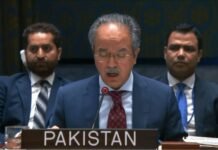Rawalpindi, 6 August 2022 (TDI): While on an official visit to Pakistan, Lieutenant General Romulusz Ruszin-Szendi, the Commander of the Hungarian Defense Forces, met with General Nadeem Raza, the Chairman of the Joint Chiefs of Staff Committee (CJCSC).
Lieutenant General Romulusz Ruszin-Szendi, Commander of Hungarian Defence Forces, who is on official visit to Pakistan called on General Nadeem Raza, Chairman Joint Chiefs of Staff Committee (CJCSC) at Joint Staff Headquarters, today.@OfficialDGISPR #PakistanArmy #ISPR pic.twitter.com/TgxjNo2xDu
— Pakistan Armed Forces 🇵🇰 (@PakistanFauj) August 5, 2022
The meeting took place at Joint Staff Headquarters in Rawalpindi. During the meeting, topics related to bilateral defense cooperation, including security, military exchanges, training, and the regional environment, were discussed.
The Commander of the Hungarian Defense Forces stated that these exchanges had boosted the two armies’ mutual understanding, cooperation, and bilateral defense connection.
The long-standing and robust bilateral defense collaboration between Pakistan and Hungary was confirmed by Chairman JCSC.
Earlier, a smartly dressed contingent of Pakistan Armed Forces presented Lieutenant General Romulusz Ruszin-Szendi with a Guard of Honor upon his arrival at Joint Staff Headquarters.
Pakistan-Hungary Ties
Hungary is a significant EU member state. Over the years, Pakistan and Hungary have developed positive bilateral relations.
Since 2016, Hungary has offered scholarships to Pakistani students. Hungary has currently started its outreach in Central Asia, the Middle East, South, and Far East Asia under its foreign policy project “Opening toward East.”
Each nation in the globe today is looking for markets for its goods and services on a global scale. In response to Hungary’s request for bilateral cooperation, Pakistan has taken an active role.
The trade and economic window between Hungary and Pakistan was established in March 2021. While looking into possibilities for exports to Hungary, Pakistan could benefit from the Hungarian experience.
Especially, in the areas of agriculture and food, the environment, water resource management, engineering, vocational training, and urban planning. In fact, Pakistan’s economic diplomacy strategy may benefit from the investigation of non-traditional markets.
I'm a detail-oriented, problem-solving, persistent multitasker. Having a magna cum laude MSc. in Strategic Studies from National Defense University, Pakistan, I believe in peaceful discourse & dialogue and have built my interest in nontraditional security threats.
I am an experienced writer with a primary focus on public policy, environmental security, nuclear strategy, and geopolitics!








